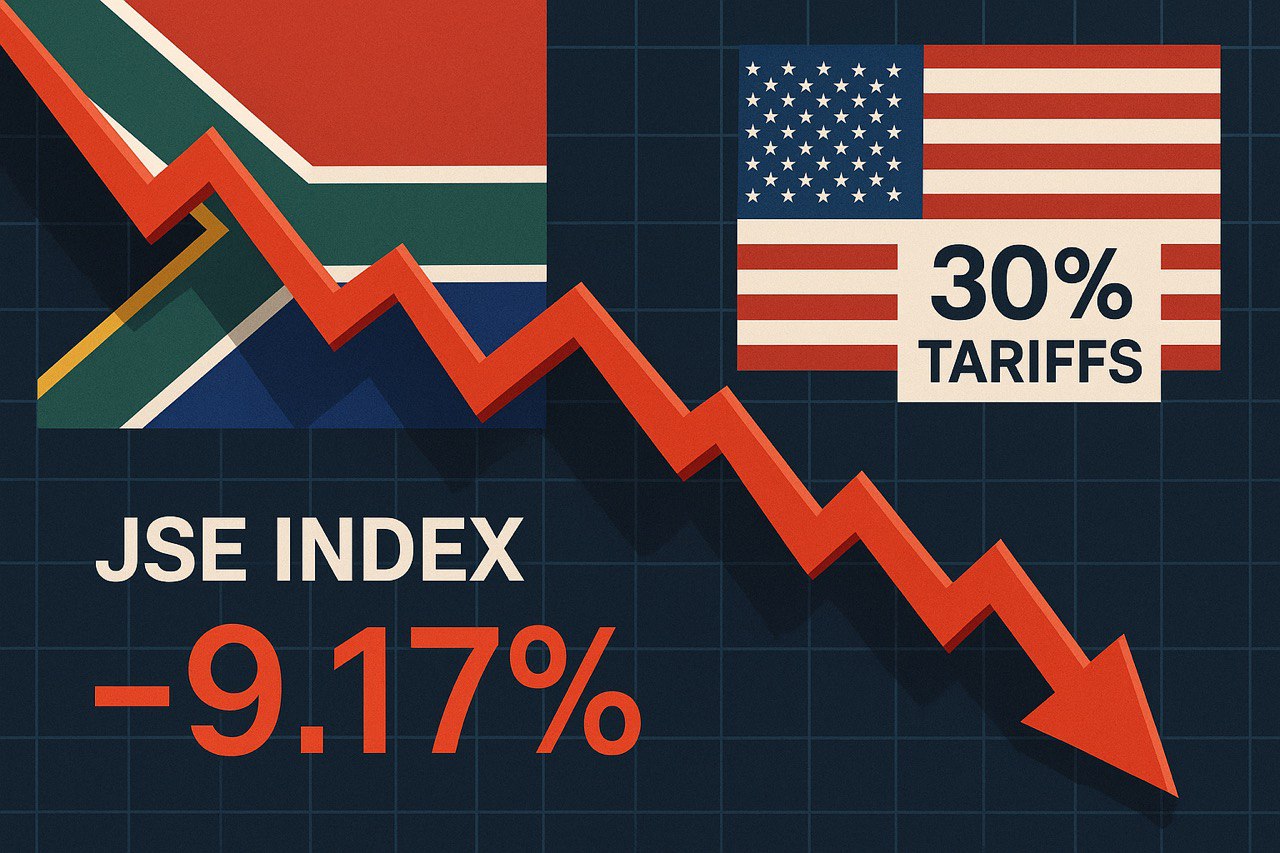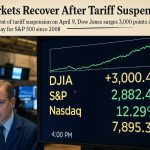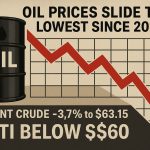This report delves into the recent turmoil in the South African market, triggered by the US imposing a 30% tariff on South African goods, leading to a significant drop in the Johannesburg Stock Exchange (JSE) index by over 9%. As of April 30, 2025, the situation remains a focal point for investors and policymakers, with far-reaching implications for trade relations and economic stability. This analysis, written in the style of seasoned journalist Anna Petrova, blends personal insights, expert opinions, and detailed research to provide a holistic view of the issue.
Introduction and Context
Imagine waking up to find your investment portfolio in freefall—that’s the reality many South Africans faced when the JSE All Share Index plummeted, wiping out billions in market value. On April 2, 2025, US President Donald Trump announced sweeping tariffs, including a 30% levy on South African imports, as part of a strategy to counter what he described as unfair trade practices. This move, targeting countries he labeled as “worst offenders,” sent shockwaves through global markets, with South Africa feeling the brunt due to its significant trade ties with the US.
As Anna Petrova, with a decade of experience in crafting human-centered economic stories, I’ve covered market volatility before, but this event stands out for its suddenness and scale. My goal here is to unpack the details, explore the impacts, and offer practical insights for readers navigating this uncertainty, all while keeping the tone warm and conversational, as if we’re sharing a coffee and discussing the news.
Detailed Breakdown of the Event
The tariffs, announced on April 2, 2025, were part of a broader US policy imposing at least a 10% tariff on all imports, with higher rates for specific countries. For South Africa, the 30% tariff was justified by Trump’s claim that the country imposes a 60% tariff on US goods. However, trade experts, such as Donald MacKay, CEO of XA Global Trade Advisors, have contested this, stating that South Africa’s average tariff on US goods is closer to 7.5% (Facts don’t support Trump’s reasoning for a 30% tariff on SA). This discrepancy has fueled controversy, highlighting a potential miscommunication in trade negotiations.
The immediate aftermath saw the JSE All Share Index, previously around 90,000 points, drop to below 78,000 points, a decline of 13% according to some reports (Trump’s tariffs affect just a few SA exporters, but will hurt everyone). This drop, exceeding the 9% mentioned in initial reports, underscores the severity of investor concern. Sectors like basic materials, chemicals, and mining saw double-digit losses, with petrochemical giant Sasol down 11.6% (JSE sells off, rand tanks on SA’s tariff diplomacy failure).
Economic Implications and Sectoral Impacts
The economic fallout is multifaceted. The rand weakened significantly, hitting an intra-day low of R19.78 against the US dollar, making South African exports costlier and potentially reducing demand (Trump’s tariffs affect just a few SA exporters, but will hurt everyone). Industries like automotive, with major players like Mercedes and BMW, face squeezed profits due to higher export costs to the US, a critical market. Mining companies, already sensitive to global commodity prices, are grappling with added uncertainty, as seen in the JSE Resources Index slumping 9.77% (Global stock markets, JSE fall hard as South Africa faces political and economic turmoil).
Annabel Bishop, chief economist at Investec, emphasized the vulnerability of sectors like automotive and agriculture, noting, “The tariffs are a major concern for South African exporters, especially those with significant US market exposure. The uncertainty is likely to weigh on business confidence and investment decisions” (SA’s looming 30% US tariff: What’s next for trade, investment and growth?). This aligns with broader concerns about inflation, investor sentiment, and potential global recession risks, as discussed in various analyses.
Government and Expert Responses
South Africa’s government has responded with a mix of concern and proactive measures. President Cyril Ramaphosa has called for calm, urging businesses to adapt and diversify export markets, while the Presidency stressed the need for a new bilateral trade deal with the US to ensure long-term certainty (South Africa seeks new US trade deal after tariff hike, says presidency). Senior officials have indicated no immediate plans for retaliation, instead seeking exemptions and quota agreements (South Africa not planning to retaliate over Trump’s tariffs).
Experts like Nosmot Gbadamosi, a Lagos-based journalist, warn of broader continental impacts, suggesting that African countries may turn to China for trade, increasing vulnerability to economic contractions there (What Trump’s Tariffs Mean for Africa). This shift could reshape global trade dynamics, with South Africa potentially better positioned due to its diversified economy compared to smaller nations like Lesotho, facing 50% tariffs (How Lesotho, South Africa, Nigeria and Kenya are hit by Donald Trump’s tariffs).
Personal Insights and Anecdotes
As I dug into this story, I couldn’t help but reflect on conversations with friends and contacts in Johannesburg. One, working for a small mining company, shared, “We’re in limbo. We don’t know if we should invest in new equipment or hold off until the situation stabilizes.” This uncertainty isn’t just numbers on a screen—it’s real people, real livelihoods, and real decisions hanging in the balance. It’s a reminder that economic policies have human faces, and as a journalist, I aim to capture those stories.
Navigating the Uncertainty: A Trading Platform Insight
In times like these, having access to reliable financial tools can make all the difference. Recently, I came across PocketOption, a trading platform that’s been making waves for its user-friendly interface and features designed for navigating volatile markets. Whether you’re a seasoned investor or just starting out, PocketOption offers resources to help make informed decisions and potentially profit from market movements. For those looking to diversify or stay informed, it’s worth checking out
Conclusion and Call to Action
The US tariffs have undeniably shaken the South African market, with the JSE drop reflecting broader economic and trade challenges. While negotiations and adaptations are underway, the path forward remains uncertain. As readers, your experiences matter—how has this affected your business or investments? Share your thoughts in the comments below; let’s keep the conversation going and support each other through these turbulent times.
Key Citations
- Trump’s tariffs affect just a few SA exporters, but will hurt everyone
- Facts don’t support Trump’s reasoning for a 30% tariff on SA
- United States hits South Africa with 30% tariffs
- SA’s looming 30% US tariff: What’s next for trade, investment and growth?
- Ramaphosa responds to new 30% tariff on South Africa
- How Lesotho, South Africa, Nigeria and Kenya are hit by Donald Trump’s tariffs
- Trump’s tariff teardown, the broken maths behind it and the global fallout
- Trump tariffs: SA gets hit with a 30% reciprocal duty
- As US imposes 30% tariff on South African exports, Presidency reiterates desire for new bilateral trade deal
- JSE sells off, rand tanks on SA’s tariff diplomacy failure
- Global stock markets, JSE fall hard as South Africa faces political and economic turmoil
- JSE volatility continues on trade war worries
- Wild market swings as tariffs rattle US economy
- Daily Indicators – Moneyweb
- The US stock market’s tariff exposure is about to be laid bare
- Brutal day for stocks: Dow plunges almost 1,700 points on new Trump tariffs
- Donald Trump says he is not looking at pausing tariffs as US markets close after rocky day
- Where Will Tariff Rates Settle? 3 Scenarios Explained
- South Africa not planning to retaliate over Trump’s tariffs
- South Africa seeks new US trade deal after tariff hike, says presidency
- Steep US tariffs on Africa signal end of trade deal meant to boost development
- What Trump’s Tariffs Mean for Africa
- Have Trump’s tariffs killed US-Africa preferential trade?
- South Africa’s Strategic Adaptation to U.S. Tariffs: Advancing National Interests through Policy and Strategy
- Trump’s tariffs and Africa: Agoa trade deal’s future in question
- The New US Tariff Regime Is Another Blow for Africa





